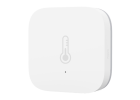
Temperature sensors for a smart home are modern devices designed for monitoring and controlling climate conditions in residential spaces. They integrate into the "smart home" system and ensure an optimal level of comfort and energy efficiency. Thanks to built-in sensors, these devices accurately measure the current temperature in various zones of your home.
The main advantages of using temperature sensors in a smart home include:
1. **Climate control automation**: Sensors can interact with thermostats, air conditioners, and heating systems, automatically adjusting the temperature according to your preferences and external conditions.
2. **Energy savings**: The devices help reduce energy consumption costs by adjusting the operation of heating and cooling systems only when necessary.
3. **Remote control**: Many sensors are compatible with mobile applications, allowing owners to control the temperature and manage devices from anywhere in the world.
4. **Integration with other systems**: Temperature sensors can be part of a more comprehensive home security and management system, interacting with smart door locks, lighting, and other devices.
5. **Historical data and analytics**: Collected temperature data can be analyzed to understand climate trends and optimize system performance in the future.
Temperature sensors for a smart home are not only convenient but also a step towards more ecological and efficient resource use. With them, your home will become not only comfortable but also smarter.
The main advantages of using temperature sensors in a smart home include:
1. **Climate control automation**: Sensors can interact with thermostats, air conditioners, and heating systems, automatically adjusting the temperature according to your preferences and external conditions.
2. **Energy savings**: The devices help reduce energy consumption costs by adjusting the operation of heating and cooling systems only when necessary.
3. **Remote control**: Many sensors are compatible with mobile applications, allowing owners to control the temperature and manage devices from anywhere in the world.
4. **Integration with other systems**: Temperature sensors can be part of a more comprehensive home security and management system, interacting with smart door locks, lighting, and other devices.
5. **Historical data and analytics**: Collected temperature data can be analyzed to understand climate trends and optimize system performance in the future.
Temperature sensors for a smart home are not only convenient but also a step towards more ecological and efficient resource use. With them, your home will become not only comfortable but also smarter.
There are no products to list in this category.
